Статьи журнала - Arctic and North
Все статьи: 972
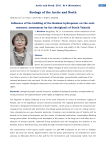
Статья научная
South Yakutia is the territory of residence of the native population (Evenki) and intensive industrial development. Sector studies have shown the presence of permanent factors that substantially affect the process of adaptation to the realities of life. Rapid changes of socio-economic structure of modern society have led to the emergence of new social and socio-political factors that have an intense impact on the Aboriginal community Evenki. The system of belief, constant communion with nature help to survive in the harsh environment of Evensk taiga, uncomfortable conditions of the national settlement with one hand. On the other, the invasion of industry on the territory of traditional nature compels Aboriginal community to increase their civic position, be able to assert their rights.
Бесплатно
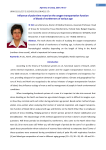
Статья научная
The work shows the results of studying the oxygen transportation function of blood of northerners of working age. It shows the dynamics of hematological variables depending on the length of living in the North (northern time record), which is important for human ecology.
Бесплатно
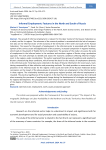
Informal Employment: Features in the North and South of Russia
Статья научная
The spread of informal employment is relevant for the labor market of the Russian Federation as a whole, and for its regions. The relevance of the research problem is associated with the lack of comparative data on the informal sector of the economy of the territories of the north and south of the Russian Federation. The reason for the growth of employment in the informal sector is associated with the development of the service sector and digitalization of the economy, increased competition in regional markets, which leads to the growth of flexible forms of employment. The purpose of the study is to assess the scale of employment in the informal sector in the northern and southern regions of Russia using a production approach. The work attempts to identify and assess the economic conditions affecting informal employment in the regions under consideration. The author examined three groups of conditions and selected indicators characterizing these conditions, which formed the basis for the analysis of employment dynamics in the informal sector. Panel data were collected on the basis of Rosstat information for recent years, maintaining comparability of data collection and processing methods. The study provides an assessment of employment in the informal sector for the regions of the south and north of the Russian Federation draws conclusions on the impact of the above groups of economic factors on employment in the informal sector in these regions. The relationship between per capita gross regional product and informal employment is revealed. The practical significance of the study lies in the fact that the results obtained may be in demand when assessing the processes of employment change during the development of strategies and programs for regional development. The prospects for further research are determined by a more in-depth analysis of the degree of influence of the current socio-economic situation on the level of employment in the regions.
Бесплатно
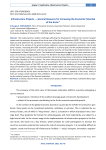
Infrastructure projects — general resource for increasing the economic potential of the Arctic
Статья научная
The study examines modern challenges affecting the development of the Arctic marine transport system and the economic situation of the Arctic zone of the Russian Federation (AZRF). The basic normative legal acts that determine the activities of economic organizations in the Arctic are presented. It was determined that in the context of the world economy regression caused by geopolitical, economic, natural and other reasons, increasing the AZRF economic potential is a priority goal, and the implementation of tasks for the Arctic zone development and ensuring national security corresponds to the implementation of the Fundamentals of State Policy of Russia. The tendency of competitive struggle by the Arctic countries on the issues of economics and geopolitics is noted. The Northern Sea Route (NSR) is presented as the basis of the Arctic sea transport system, its economic potential, international importance, international integration with the People's Republic of China is shown. The main infrastructural projects of the Arctic for the development of the oil and gas complex, the construction of an icebreaker fleet, the construction of new and modernization of the existing ports of the NSR, etc. are presented to solve the problems of increasing cargo traffic along the Northern Sea Corridor. New projects for modernization of port infrastructure, transport development, etc. are considered. The purpose of the study is to assess the ongoing and planned infrastructure projects carried out by the state and business to increase the economic potential of the Arctic. Many of them are unique, which expresses firm confidence in the modern development of the Arctic zone, in ensuring the national security of the Russian Federation.
Бесплатно
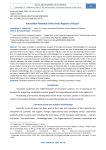
Innovation Potential of the Arctic Regions of Russia
Статья научная
The paper provides a comparative analysis of foreign and Russian methodologies for assessing innovation potential. It is shown that foreign methodologies cannot be used to determine the innovation potential of the Arctic regions of Russia due to specific indicators that are not calculated by Russian statistics. It is determined that the use of Russian methodologies for an objective assessment of the Arctic regions in terms of innovation potential is difficult. In this regard, the authors developed a comprehensive methodology for assessing innovation potential, the principal novelty of which consists, firstly, in the use of specific indicators (in other methods, the authors use not specific, but absolute statistical indicators); secondly, only indicators that characterize innovation development are used; thirdly, expert research methods are excluded. According to the results of the analysis of statistical data, it is determined that the Arctic regions have low rates of innovation development and lag behind the average Russian values. Based on the proposed methodology, the innovation potential was calculated and the Russian regions were ranked for ten years, including 2011, 2013, 2017 and 2020, in order to compare the dynamics of the Arctic regions. It is shown that the Arctic regions are characterized by rather low values of innovation potential and are mostly below 50th place in the ranking of Russian regions.
Бесплатно
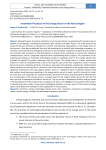
Innovation Processes in the Energy Sector of the Arctic Region
Статья научная
Moving forward, striving for perfection of any human activity is associated with innovative development of technologies, manufactured products, labor relations and other factors. The study presents the results of the joint activities of educational, scientific and industrial organizations in the energy sector of the country. It has been established that with the acceleration of scientific and technological progress, innovations and investment technological processes are becoming key components of government and business activities that contribute to the development of energy sector companies to ensure their long-term competitiveness, which is especially important when implementing Arctic projects. The importance of developing and creating an innovative technological product is especially acute in the energy industry that provides life support for people, businesses, and the country. The energy sector is a rather conservative industry in terms of innovations (this is due to the long life cycle of the main equipment, which is several dozens of years), created by domestic enterprises using exclusively domestic components. Modernization and construction of new facilities in the Arctic zone of the Russian Federation in the energy sector requires significant investments with long payback periods, which is a significant factor in decision-making. Small and medium-sized businesses operating in the energy sector are set to make a profit in the short or medium term, but such companies are characterized by a low level of research and development. Nevertheless, the reconstruction of the energy sector is an urgent topic for the industry today, due to the fact that the wear and tear of equipment exceeds its service life. The key results of investment activities and key trends in the development of the energy sector, including in the Arctic, are highlighted. The purpose of the study is to identify long-term trends in innovative technological solutions in various areas of the country’s energy sector and to determine methods for their application in Arctic projects.
Бесплатно
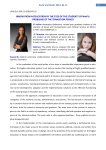
Innovation in education by the eyes of the students of NArFU: problems of the transition period
Статья научная
The article tries to compare the ideal vision of NArFU and reality, marked by the student audience.
Бесплатно
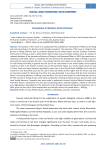
Innovations in Western Arctic Fisheries
Статья научная
The purpose of this article is to substantiate the possibility of increasing the efficiency of fishing and crab harvesting in the Western Arctic through innovation. The relevance of this issue is related to the decline in fishing efficiency due to sanctions imposed by the United States and the European Economic Community on fishing, as well as other factors that increase costs and reduce product value. An analysis of selected indicators of the economic efficiency of fishing in the Murmansk Oblast in 2021 was carried out in comparison with 2013, which is considered the last period of the development stage of fishing in accordance with the classic business life cycle. It was shown that the main impact on the decline in the efficiency of crab fishing and fishing in general was the loss of the crab market in the United States and European countries, as well as the need to reorient sales to the Asia-Pacific region. As a result, import prices for crab in China, Korea and Japan became significantly lower than in the United States ($40/kg) and in the EEU countries. It was found that prices for live crab in China are almost 3 times higher than for frozen crab, and an innovative system for delivering it to China alive was developed. It was shown that the main innovative factor in increasing efficiency in fishing is the new fleet. The use of new vessels for crab fishing will ensure a 20–50% increase in fishing results, while labor productivity in fishing should increase by about 2 times, and costs should decrease. Proposals have been made to potentially increase fishing efficiency through other innovative factors: introduction of a new catch accounting system, improved logistics, release of new products, digitalization, development of the domestic market through improved pricing and competition, etc. In 2024, prices for live crab in China reached their pre-sanction level in the United States — $40/kg.
Бесплатно
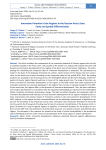
Innovative Potential of the Regions in the Russian Arctic Zone: State and Spatial Differentiation
Статья научная
The article considers the components of the innovation potential of Russian regions that are fully or partially included in the Arctic zone. The purpose of the article is to analyze and evaluate the state and dynamics of innovative development of the regions of the Arctic zone of the Russian Federation. The methodology for calculating the composite index of innovative development is proposed. The calculations are made on the basis of the database formed by the authors, which consists of four blocks; the main conclusions on the blocks are formed. According to the composite index for the period 2015-2021, the leading positions are occupied by the Krasnoyarsk Krai, the Arkhangelsk Oblast and the Komi Republic, and the Republics of Karelia, Sakha (Yakutia) and Komi in terms of the index growth rate. The study of the state, dynamics and level of innovation development in the regions of the AZRF shows that some components of innovation potential are unevenly developed in the regions that are fully or partially included in the AZRF. At the same time, the regions differ in the dynamics of innovative development. Thus, the worst indicators of innovative development in accordance with the proposed methodology are observed in the Arkhangelsk Oblast, Chukotka and Nenets Autonomous okrugs. The high correlation between the composite index of innovative development and indicators of socio-economic development of the regions revealed by the authors characterizes the positive impact of innovation activity on the socio-economic development of the AZRF subjects. In this regard, the key recommendations are the following: improvement of legislative support for the formation of eco-industrial, tourist zones, innovation sites and cluster formations in the Arctic territory within the framework of testing new formats of economic intensification of the Russian Arctic regions; formation of a macro-regional register of suppliers of innovative products for the projects of residents of the AZRF with the distribution of preferential measures of a special economic and administrative regime. The prospects of the research are related to the study of critical vulnerabilities in the production and technological processes of the sectors of specialization of the Arctic regions in import substitution.
Бесплатно
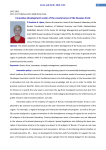
Innovative development vector of the coastal areas of the Russian Arctic
Статья научная
The article examines the opportunities for further development of the Arctic zone of the Russian Federation on the basis of innovative standards and technology, as the whole system of state management of innovation processes should be based on innovative strategy of the state in general and the region in particular, without which it is impossible to imagine a real, deep and lasting renewal of the economy and entire society.
Бесплатно
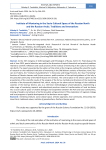
Статья научная
At the 15th Congress of Anthropologists and Ethnologists of Russia, held in St. Petersburg at the end of June 2023, special attention was paid to the discussion of topical theoretical and practical problems related to scientific reflections and social practices of the institute of mentoring in the cultures of the Russian North. The report presented by the authors of this article at the Congress outlined the scientific results of research on the traditional institution of mentoring in the Old Believer societies of Karelians, Komi, Russian Ust-Tsilems, the “institute of grandmothers” in Kenozerye and Onega Pomorie, the ritual “mentoring” functions of Nenets shamans and Zyryan sorcerers, public practices of the spiritual guidance of the laity in the parochial community of the North Russian mir-zemstvo. The central place in the article is given to the presentation of the scientific results of the analysis of the forms, methods and directions of the mentoring activities of the Kenozerskiy National Park, which, relying on the ethno-cultural heritage of the traditional societies of the Ozernyy district, acts as a reference methodological school-laboratory, implementing a wide range of mentoring research and educational practices aimed at transformation of local territories into a socio-cultural space of creative dialogue and cooperation between the Park and local communities, training of leaders and activists of territorial public self-government (TPS), elaboration of regional strategy and local programs of spatial development of the Northern macro-region.
Бесплатно
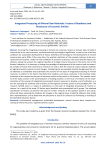
Статья научная
Ensuring the integrated processing of mineral raw materials remains a relevant topic of modern research due to its socio-economic, environmental and technological significance, as well as one of the key conditions for sustainable development of Russia, defined by the Strategy for the development of mineral resource base up to 2035. At the same time, the practical realization of this concept continues to be occasional and non-systemic. Under the new conditions of sanctions restrictions, the acute need for import substitution, taking into account the regional specifics of strategic mineral resources in the Arctic zone of the Russian Federation, it is necessary to change the paradigm of development of the resource and raw materials complex of Russia from extensive to intensive one and to shift the research context towards readiness of regional economic systems to such changes. Considering the accumulated scientific background, the article attempts to consolidate and systematize the research on the topic of integrated processing of mineral resources in relation to the factors that determine readiness and cause resistance to the practical implementation of the concept on the part of economic entities as key actors in this process. The scientific novelty of the study consists in the systematization of existing positions on the issue of transition to the implementation of the concept of integrated processing of mineral resources to develop a set of indicators as a tool for assessing the readiness and resistance of the regional economic system to the paradigm shift. The research method used is a review of publications on the topic of integrated processing of mineral resources. As a result of the study, 20 factors were identified and systematized into 5 groups. The obtained classification of factors can become the basis for further research of the question posed in this article, which will allow assessing the readiness for changes at the regional level, to identify obstacles that hinder their implementation, and to determine the directions of search for solutions to eliminating or levelling of the identified resistance factors.
Бесплатно
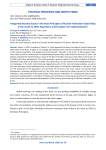
Статья научная
March 5, 2020, President of Russia V.V. Putin approved the Basic Principles of Russian Fedration State Policy in the Arctic to 2035. It is a strategic planning document aimed at ensuring the national security of the Russian Federation and designed to protect Russia's interests in the Arctic. It defines goals, directions, tasks, as well as mechanisms for implementing Russian policy in the Arctic for the next 15 years. The authors analyzed the implementation results of the Basic Principles of Russia's State Policy in the Arctic until 2020 and further perspectives. The article provides a general outline of the Basic Principles of Russian Fedration State Policy in the Arctic to 2035. The authors focus on the analysis of the leading national security challenges in the Arctic and enhancing integrated security of the fuel and energy complex, as well as the main directions of the implementation of the state policy of the Russian Federation in the Arctic. They are the protection of the population and territories of the Arctic zone from natural and human-made emergencies, enhancing national security in the Arctic zone, ensuring the military security of the Russian Federation, and protection of the state border of the Russian Federation. It is emphasized that the comprehensive implementation of the Basic Principles will contribute to improving the quality of life of people in the Arctic zone, socio-economic development of the country, and increasing its defense capability in the Arctic.
Бесплатно
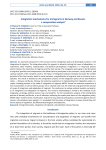
Integration mechanisms for immigrants in Norway and Russia: a comparative analysis
Статья научная
An essential component in the structure of the immigration policy of developed countries is the integration of migrants. The integration policy for migrants is aimed at solving the issues of adaptation, inculturation, labor mobility, naturalization, and political participation. Integration is a reciprocal process which involves the interaction of migrants and the host society. The integration policy goal is the formation of migrants' qualities and competencies that allow them to participate in the economic, social, political, and spiritual spheres of the recipient country. The failure of integration policies inevitably increases the conflict potential of the host society, leads to social exclusion, marginalization of migrants, and an increase in xenophobia. The article is devoted to the comparative analysis of the integration policy of the two Northern states — Norway and Russia. Norway has extensive experience in implementing the integration policy, occupies a leading position in the index of integration of migrants MIPEX. Russia has extensive experience in the incorporation of various ethnic groups into a national state, but the state has long ignored the solution of issues of integration and adaptation of migrants. The study aims to analyze national models and practices of integration and adaptation of migrants. The research methodology is linked to the methods of demography, sociology, political science, law, and statistics. For the comparative analysis of the immigration policies of Norway and Russia, a set of indicators reflecting the quality and status of the integration policy, MIPEX (labor market, family reunification, long-term stay, political participation, protection against discrimination, naturalization) was applied. It is concluded that the policy of integration in Russia should have different objects of regulation, be differentiated by goals and objectives.
Бесплатно
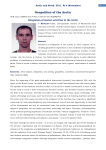
Integration of marine activities in the Arctic
Статья научная
Questions of integration of sea activity in Arctic regions, its increasing geopolitical importance in the conditions of globalisation, the status of Northern sea way are considered. Creation of «soft» corporate structures, such as consortia or noncommercial partnership, «the Sea forum» to Norway, the Netherlands Sea Community allows to solve effectively problems of coordination of economic activities, protection and lobbying of interests of its participants. There is actual a military-economic integration into Arctic regions, maintenance of national safety.
Бесплатно
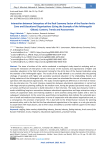
Статья научная
The team of authors of the article conducted a sociological study aimed at analyzing and assessing the interaction of enterprises in the real sector of the economy and organizations of higher and secondary education in the field of personnel training for the Arctic Zone of the Russian Federation using the example of the Arkhangelsk region. The results of the study allowed us to conclude that the growing shortage of specialists with higher and secondary vocational education in the shipbuilding, forestry and fishing industries of the Arkhangelsk region in recent years has stimulated the interest of enterprises in cooperation with educational organizations. The study revealed significant differences in the level of interaction by enterprise size. The most intensive cooperation between educational organizations is carried out with large enterprises planning staffing for the medium term, having the greatest personnel needs, as well as human and financial resources to build interaction in their interests. The study also showed a trend towards establishing long-term connections between educational organizations and large enterprises using a variety of cooperation tools and involving students in work activities during their studies with a view to subsequent employment. At the same time, quantitative and qualitative data indicate the vulnerable position of small and medium-sized enterprises in terms of cooperation with educational organizations and, as a consequence, the provision of personnel. This is due both to the limited human resource for planning personnel policy, and to the fact that the few educational organizations in the region, as a rule, give priority to cooperation with major players, due to their status and ability to provide material support to the educational institution.
Бесплатно
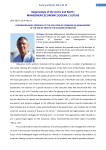
Статья научная
The article analyzes the possible ways of the decision of problems of management of the Arctic zone of Russia from the position of the interdisciplinary approach.
Бесплатно
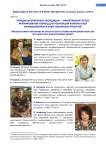
Статья научная
In the given article we represent our final results of the inter-disciplinary expeditions of the students, post-graduate students and tutors of the 4 universities of Krasnoyarsk to the villages and localities, inhabited by the indigenous minorities of the North of the Krasnoyarsk Region.
Бесплатно
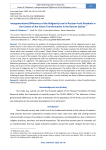
Статья научная
The article examines the problem of intergenerational dynamics of the religiosity level in post-Soviet Russia in the context of cultural transformations, combining the movement towards postsecularity and the domination of secular values of late modern societies. The paper analyzes the all-Russian data, obtained within the framework of the project “World Values Survey”, as well as data on religiosity and value orientations of the population of some Russian Arctic regions, obtained with the direct participation of the author. As a result of the analysis, the author verifies several hypotheses and comes to certain qualitative results. Firstly, there is a generational shift from traditional values to secular-rational values in modern Russia (according to R. Inglehart). The beginning of this process falls on the period of the socialization of the Millennial generation, the context of which is the economic and political reforms of the 1990-2000s. Secondly, the process of the intergenerational transformation of values is organically associated with a decline in the level of religiosity, but it is “delayed” by one generation. The author offers an explanation for this desynchronisation. Thirdly, it is shown that the religiosity level of the population of the Arctic territories is lower (in general and by generations) in comparison with the all-Russian religiosity level. The factors contributing to these differences, according to the author, are the relatively low share of Muslim population in the Russian Arctic and its high level of urbanization.
Бесплатно
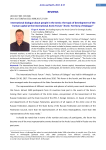
Статья научная
The International Arctic Forum “Arctic: Territory of Dialogue", held at the end of March 2017 in Arkhangelsk, has become one of the most representative events devoted to the Arctic issues in Russia in recent years. The business program of the event included a plenary session with the participation of the Presidents of Russia, Finland, Iceland, as well as 13 thematic sessions. The theme of the forum "People in the Arctic" was most actively discussed at four thematic sessions, as well as at the special event — the Forum of the Arctic Municipalities. The article presents the main results of the discussion of the participants of the event at the sessions "The Arctic is the territory of professionals", "The Arctic is the Territory of History, Culture and Tourism", "The Arctic is the Territory of Health", "The Arctic is the Territory of the Favorable Life Environment", and also at the Forum of the Arctic Municipalities.
Бесплатно

